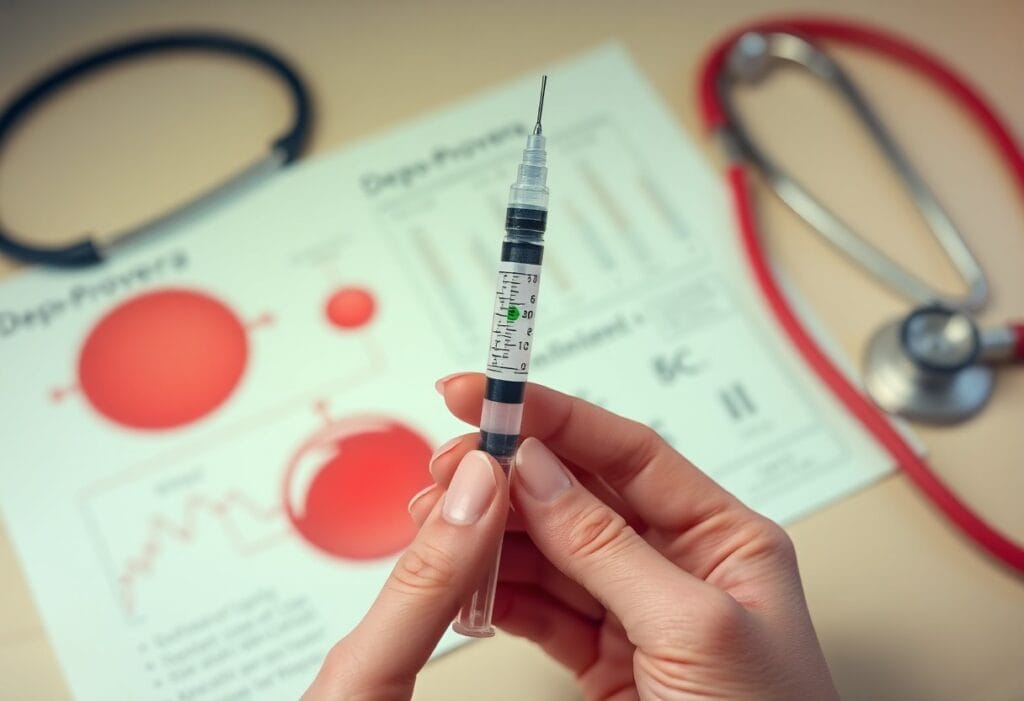With the increasing use of Depo-Provera as a contraceptive method, it’s vital for you to understand its potential risks, particularly concerning blood clots. This hormonal injection may offer convenience and effectiveness, but it also poses certain health risks that could jeopardize your well-being. In this post, we will explore the relationship between Depo-Provera and blood clot formation, helping you discern whether your choice in contraception might put you at risk.
Understanding Depo-Provera
While many people seek reliable birth control methods, understanding Depo-Provera is vital for informed decision-making. This injectable contraceptive provides protection against pregnancy for up to three months with just one shot, making it a convenient choice for many individuals.
Overview of Depo-Provera
On the whole, Depo-Provera is a hormonal contraceptive that primarily contains the synthetic hormone medroxyprogesterone acetate. Administered via injection, it works by inhibiting ovulation and thickening cervical mucus, thus preventing sperm from reaching the egg.
Mechanism of Action
Depo-Provera functions by affecting your hormonal levels. It releases progestin, which inhibits the ovaries from releasing eggs and alters the uterine lining, making it less suitable for implantation. Additionally, it thickens the cervical mucus, deterring sperm mobility. This combination effectively reduces your chances of obtaining pregnancy.
Indeed, understanding how Depo-Provera operates highlights its effectiveness as a contraceptive option. By providing a continuous supply of medroxyprogesterone acetate, it creates a stable hormonal environment that inhibits ovulation, serving as a reliable method for those who prefer long-lasting solutions. However, it’s important to be aware of potential side effects, including the increased risk of blood clots, and to discuss these with your healthcare provider.
Blood Clots and Their Risks
If you’re using Depo-Provera, understanding the risks associated with blood clots is imperative. Blood clots can be a serious health issue, leading to complications such as deep vein thrombosis or pulmonary embolism. Staying informed about the potential for blood clots while on Depo-Provera can empower you to make the best decisions for your health.
Types of Blood Clots
An array of blood clots can affect your health, and recognizing them is key. The major types include:
- Deep Vein Thrombosis (DVT)
- Pulmonary Embolism (PE)
- Arterial Clots
- Venous Thromboembolism (VTE)
- Superficial Thrombophlebitis
Thou should be aware of these types to understand your risks better.
Factors Contributing to Blood Clots
Clots can form due to various factors that increase your risk. Some contributing factors include:
- Hormonal Changes
- Prolonged Immobility
- Obesity
- Smoking
- History of Clots
Perceiving the interplay of these factors can help you manage your health effectively.
Further, the formation of blood clots may arise from several interconnected factors that influence their development. Hormonal changes, particularly those brought on by contraceptives like Depo-Provera, can increase the likelihood of clotting. Additionally, prolonged immobility, often due to long travel or bed rest, can elevate risk. Obesity and smoking further compound your chances. Lastly, if you have a history of clots, your risk profile can be heightened significantly. Perceiving these contributors enables you to take proactive steps towards minimizing your risks.

The Connection Between Depo-Provera and Blood Clots
One of the primary concerns surrounding Depo-Provera is its potential link to blood clots. Research indicates that hormonal contraceptives, including Depo-Provera, can elevate the risk of thromboembolic events, which may lead to serious complications. Understanding these risks is vital for making informed decisions about your contraceptive options.
Research Findings
Between various studies conducted, results show that hormonal contraceptives, such as Depo-Provera, are associated with an increased risk of blood clots compared to non-hormonal methods. While the overall risk is still relatively low, awareness of your personal health factors and family history is important in assessing your risk level.
Comparative Risk Analysis
DepoProvera is distinguished by its differing levels of risk compared to other contraceptive methods. The following table outlines these comparative risks:
Comparative Risk of Blood Clots
| Contraceptive Method | Relative Risk of Blood Clots |
|---|---|
| Depo-Provera | Higher Risk |
| Combined Oral Contraceptives | Higher Risk |
| Progestin-Only Pills | Lower Risk |
| Non-Hormonal Methods | Minimal Risk |
Even with elevated risks associated with Depo-Provera, it still remains a trusted choice for many women. When considering your options, it’s vital to weigh your personal health factors, such as family history of blood clots or other conditions that may increase your risk. Taking the time to consult with your healthcare provider can help you make an informed decision about the best contraceptive method for you.
Symptoms of Blood Clots
All women taking Depo-Provera should be aware of the potential symptoms of blood clots. Symptoms can vary based on the location of the clot but may include swelling, pain, warmth, and redness in the affected area, or shortness of breath and chest pain if the clot travels to the lungs. Awareness of these signs is key to ensuring your health is safeguarded.
Recognizing Warning Signs
Along with the common symptoms, you should be vigilant for any sudden changes in your body. Unexplained pain in your leg, especially if it feels swollen or tender, along with a feeling of heaviness, could indicate a clot. If you experience sudden difficulty breathing or sharp chest pain, do not ignore these warning signs, as they could signal a more serious issue.
When to Seek Medical Attention
Across the board, if you suspect you have a blood clot or experience concerning symptoms, don’t hesitate to seek medical attention. Your health is paramount, and early intervention can make a significant difference in outcomes.
Clots can lead to severe complications if not addressed promptly. If you experience sudden swelling, pain, or discoloration in your leg or foot, or if you have difficulty breathing or chest pain, immediate medical attention can be life-saving. Do not wait for symptoms to worsen; instead, contact your healthcare provider as soon as you notice troubling signs or changes in your health. Quick action can prevent serious consequences.
Who Is Most at Risk?
Unlike many other contraceptive methods, Depo-Provera may pose a higher risk of blood clots for certain individuals. Understanding your personal risk factors can help you make informed decisions regarding your health and contraceptive options.
Demographic Factors
Factors that influence your risk of developing blood clots while using Depo-Provera include:
- Age: Women over 35 may be at a greater risk.
- Obesity: Higher body mass index can increase your chances.
- Smoking: Tobacco use can significantly elevate your risk.
- Family history: A history of blood clots in your family raises concerns.
Recognizing these demographic factors can guide your discussion with a healthcare provider about the suitability of Depo-Provera for you.
Personal Medical History
Among the most significant factors influencing your risk is your personal medical history. If you have any previous incidents of blood clots, heart conditions, or certain cancers, your risk level may be heightened.
Understanding your personal medical history is vital when evaluating your risk with Depo-Provera. For example, if you’ve experienced deep vein thrombosis, pulmonary embolism, or have a history of complications such as hypertension or certain autoimmune disorders, your chances of developing blood clots while using this contraceptive method can significantly increase. Additionally, if you’ve had a previous issue with birth control methods that contain estrogen, this warrants deeper exploration with your healthcare provider. This comprehensive view of your health history can better inform your contraceptive choices and facilitate safer options tailored to your needs.
Alternatives to Depo-Provera
Once again, it’s important to consider your options when it comes to birth control. While Depo-Provera may be effective for some, there are many alternatives available that offer different benefits and side effects. Exploring these options can help you make an informed decision that aligns with your health needs and lifestyle.
Other Contraceptive Options
Below, you’ll find a variety of contraceptive methods to consider, including hormonal pills, patches, IUDs, and natural family planning. Each option has unique characteristics that may make it more suitable for you depending on your health status, convenience, and personal preferences.
Considerations for Choosing Contraceptive Methods
An vital aspect of selecting a contraceptive method is understanding your personal health history and lifestyle. Factors such as age, smoking status, and any pre-existing medical conditions can significantly influence your choice of birth control.
Understanding your specific health needs is key to picking the right contraceptive method. Consulting with your healthcare provider about your medical history can help you weigh the advantages and potential risks of each option. For instance, some methods carry an increased risk of blood clots, while others may offer additional non-contraceptive benefits, such as regulating your menstrual cycle. Taking the time to consider these factors helps ensure that you choose a method that supports your overall wellbeing.
Final Words
Ultimately, understanding the potential risks of Depo-Provera, particularly regarding blood clots, is crucial for your health. While many users experience no serious side effects, it’s important for you to stay informed about how this contraceptive may affect you personally. Regular check-ins with your healthcare provider can help monitor your situation and address any concerns. By staying proactive in your healthcare decisions, you can make informed choices that best support your well-being.
















